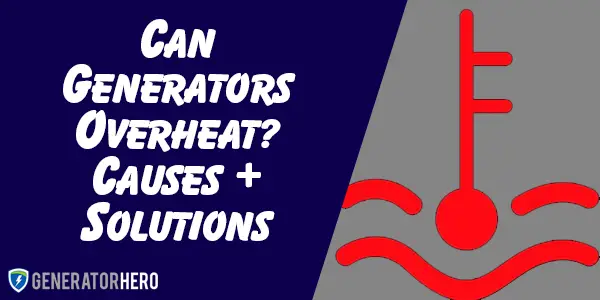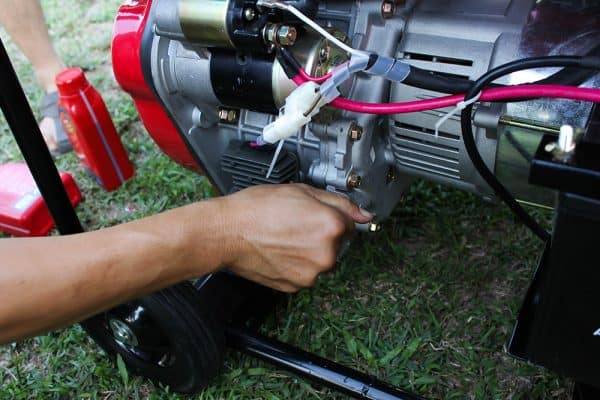Help! My generator is overheating. There are common reasons for a generator to overheat, but most can be corrected before lasting damage happens. Many newer generators come with temperature gauges and sensors that allow the generator to automatically shut down before severe damage occurs.
A few things can go wrong with a generator, but overheating should not be one. This article will look at some causes for a generator to overheat.
Table of Contents
What Causes a Portable Generator to Overheat?
Exhaust Blockage
As discussed in other articles, it is essential to place your generator in an area that allows airflow to dissipate the exhaust fumes. Whether your generator is housed in a shelter or free-standing, nothing must block the exhaust pipe. Before starting your generator, it is good to check the exhaust pipe and make sure it is clear of dust, debris, bee or bird nests, or cobwebs (yes, that is possible). Foliage growing around the generator should be cut back to allow for air movement, as well.
Dirty Oil Filter
Proper regular maintenance should prevent this, but a filthy oil filter can block the oil flow through the engine components. Friction caused by a lack of oil can overheat the engine, which can cause damage to the valves, pistons, and chambers. Ensure to replace the oil filter regularly, following the manufacturer’s maintenance recommendations.
It is essential to check that gaskets and clamps are tight and secure. Leaks can cause low fluid levels. As the engine heats with use, leaking oil can also ignite, causing a fire and extended damage to the generator.
Dirty Fuel Filter
As important as the oil filter, the fuel filter needs to be changed regularly. Contaminated fuel will cause damage to the engine components. While a dirty filter may not affect the engine immediately, over time, the internal damage can cause engine shut-downs, trouble to start, or potential overheating.
Electrical Overload
Every portable generator has a peak wattage load per manufacturer recommendations. Overloading by connecting too many appliances that draw more power than the generator produces at average load can cause the generator to overheat. Do not attempt to combine multiple extension cords or devices that draw more power than the generator is designed to create.
In addition, check all extension cords to ensure the insulation around the wires is secure and not exposed. Damaged wiring can short the system, which can also overheat the engine.
Another concern is that an overheating generator could cause a power surge back into the appliances connected to it.
Structural Damage
Although rare, a portable generator with structural damage from a crash, drop, or hit may experience issues that lead to overheating. Call the manufacturer to find the nearest service technician to determine the cause if this occurs.
External Heat
There are areas of the country where sunshine can be damaging. Seasonal heat can beat upon an unprotected generator causing the metal to reach temperatures upward of 120 degrees. If a generator engine is running, the external temperature can cause the internal temperature to rise exponentially, and this can cause the generator to overheat. If possible, create a shelter to protect the generator from the sun’s rays.
Can I Spray my Generator with Water?
No. Spraying cold water on hot metal can damage the structural integrity and cause cracks or severe damage to the engine and generator parts.
Water, in general, is not the friend of generators. Spraying water into the generator components risks damaging the connections and allowing moisture to enter the fuel or fuel lines. Water can cause rust to form, which can weaken the parts. Additionally, any residual water left on or inside the generator can cause electrocution upon operation.
Cooling a Sheltered Portable Generator
The following steps can be taken if you notice your sheltered generator overheating:
- Ensure the area above the generator is open and there is good air circulation.
- Install vents in the shelter to allow airflow in. Add a fan to draw cool air in and hot air out as the generator operates.
- Ensure the exhaust pipe extends outside the shelter and is completely sealed to prevent heated fumes from re-entering.
- Clear any debris and foliage from around the shelter so air can flow.

What Causes a Diesel Generator to Overheat?
Larger diesel generators are known for their efficiency and long life span, but overheating can happen as the parts age through wear and tear, lubricant, or coolant loss.
Like the portable generator, a diesel generator has similar reasons that cause overheating. The diesel generator has additional parts that can be affected, so you should know about a few different parts.
Coolant levels
Poor coolant circulation due to leaks in the tubing or loose clamps and gaskets will affect the generator’s temperature.
Dirt and Debris
Dirty dust or debris-covered generators can overheat as the dirt slows or stops any heat dissipation. This covering keeps heat in the generator.
Broken Fan
A broken cooling fan will cause the generator to overheat, prohibiting air circulation.
Clogged Fuel Injectors
Diesel injectors can become clogged, which causes the system to overload as it tries to work harder to get fuel.
Damaged & Blocked Exhaust
When the exhaust element is damaged or blocked, the heat and fumes can collect in the generator and cause it to overheat and cause a fire.
Watt Overload
When a generator is overloaded, it causes an imbalance and irregular load draw that will cause the generator to overheat.
Low Oil Level
Maintaining proper oil levels is important. When oil levels drop, the engine overheats, and further damage to components can be costly.
It is vital to maintain and care for your generator, whether portable or large diesel models.

FAQ
How do I know if my generator is overheating?
The generator may have a temperature sensor or gauge that you can monitor. If not, it may begin to make a louder noise, radiate immense heat, or run intermittently.
What happens if a generator overheats?
Turn it off and allow it to cool. Once cooled, check for leaks or external damage. Check the oil and filter, fuel filter, and look for obstructions to the exhaust. Make sure there is proper air circulation. If there is no shelter and it is hot outside, create a tent to keep the direct sun off the unit.
What makes a generator overheat?
There are several reasons a generator overheats, but it is typically due to low oil pressure, bad fuel, poor air circulation, overloading the wattage, or damaged parts.
How do I stop my generator from overheating?
Perform regular maintenance to ensure that all fluids and filters are in good shape. Check for any leaks or loose parts. Make sure there are no obstructions to airflow or exhaust.
How do you cool down a generator?
Turn the generator off and allow it to cool. Provide clean air circulation, use a fan to expel hot air. Make sure the exhaust is free of obstruction. Never spray water on your generator.
Can a generator overheat in the sun?
Yes, in the direct sun, at temperatures over 90 degrees, the metal of a generator can reach temperatures of 120 degrees. When combined with the engine’s internal temperature, this can cause the generator to overheat. If possible, create a shelter with a tarp or tent to protect the generator from the sun.
